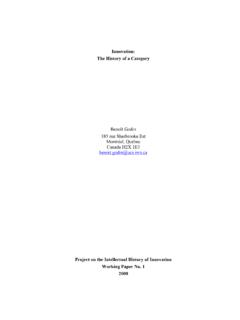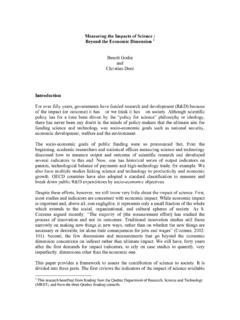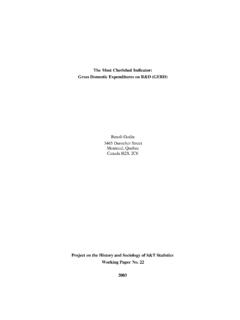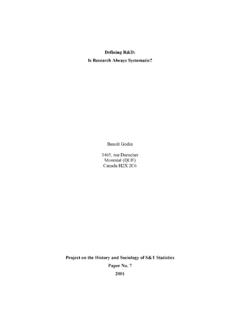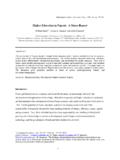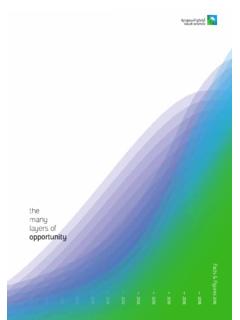Transcription of The Vocabulary of Innovation: A Lexicon - CSIIC
1 The Vocabulary of innovation : A Lexicon Beno t Godin 385 rue Sherbrooke Est Montreal, Quebec Canada H2X 1E3 Project on the Intellectual History of innovation Working Paper No. 20 2014 Previous Papers in the Series: 1. B. Godin, innovation : The History of a Category. 2. B. Godin, In the Shadow of Schumpeter: W. Rupert Maclaurin and the Study of Technological innovation . 3. B. Godin, The Linear Model of innovation (II): Maurice Holland and the Research Cycle. 4. B. Godin, National innovation System (II): Industrialists and the Origins of an Idea. 5. B. Godin, innovation without the Word: William F. Ogburn s Contribution to Technological innovation Studies.
2 6. B. Godin, Meddle Not with Them that Are Given to Change : innovation as Evil. 7. B. Godin, innovation Studies: the Invention of a Specialty (Part I). 8. B. Godin, innovation Studies: the Invention of a Specialty (Part II). 9. B. Godin, : An Old Word for a New World, or, the De-Contestation of a Political and Contested Concept. 10. B. Godin, Republicanism and innovation in Seventeenth Century England. 11. B. Godin, Social innovation : Utopias of innovation from to the Present. 12. B. Godin and P. Lucier, innovation and Conceptual innovation in Ancient Greece. 13. B. Godin and J. Lane, Pushes and Pulls : The Hi(S)tory of the Demand-Pull Model of innovation . 14.
3 B. Godin, innovation After the French Revolution, or, innovation Transformed. 15. B. Godin, Invention, Diffusion and innovation . 16. B. Godin, innovation and Science: When Science Had Nothing to Do with innovation , and Vice-Versa. 17. B. Godin, The Politics of innovation : Machiavelli and Political innovation , or, How to Stabilize a Changing World. 18. B. Godin, innovation and Creativity: A Slogan, Nothing but a Slogan. 19. B. Godin and P. Lucier, Innovo: On the Vicissitudes and Variations of a Concept. Project on the Intellectual History of innovation 385 rue Sherbrooke Est, Montreal, Quebec H2X 1E3 Telephone: (514) 499-4074 Facsimile: (514) 499-4065 Abstract innovation is certainly one of the most popular words of the modern imaginary.
4 Yet innovation is only one of many words used to talk about novelty or newness. This paper looks at the Vocabulary used to talk of innovation over the centuries. The paper compares the Vocabulary of two epistemes. The first episteme spans from the Reformation to the nineteenth century, a period when innovation was most unwelcome. The second episteme is that of the twentieth century, precisely when innovation changed meaning and acquired its lettres de noblesse. The paper documents a far more comprehensive view of innovation than that offered by some modern theorists, whose self-referencing history of innovation is repeated again and again, like a myth.
5 This canonical paradigm of the late twentieth century has eclipsed the diversity of meanings and representations of the previous decades, even centuries. 3 No one Language ever required the Use of a Dictionary more than the English [which] is founded in such a variety of other Languages [and where] daily Innovations are introduced (A Society of Gentlemen, 1768). innovation has come to mean all things to all men, and the careful student should perhaps avoid it wherever possible, using instead some other term (Ames, 1961).. 4 innovation is certainly one of the most popular words of the modern imaginary.
6 Yet innovation is only one of many words used to talk about novelty or newness. For example, in the nineteenth century, invention was the catchword. Today, artists talk of creation, and in the previous centuries of imagination. Early theorists in anthropology and sociology talk of innovation , but without using the word. It is only in the second half of the twentieth century that innovation has become a slogan, grouping a diversity of other words or concepts. innovation is part of a semantic field concerned with change and novelty/newness in a large sense. If innovation is one word among many, the intellectual history of innovation has to take into consideration a whole semantic field, as Reinhart Koselleck suggests, not identifying a concept with any single word.
7 There exist a range of synonyms, antonyms, associated terms, forming a more or less unified part of a Vocabulary at a given time . The historian seeks to identify the variety of meanings [a concept] may bear (semasiology) but also seeks out all the terms and expressions that could be used to designate the concept (onomasiology) (Hampsher-Monk et al., 1998: 2). There is a debate as to whether words are different from concepts. To Reinhart Koselleck, concepts are words with a special historical meaning. Concepts condense a multiplicity of meanings for which a word is used. A concept abridges certain forms of stabilized word use. It is an abstraction from patterns of words usage, a concentrate of several substantial meanings (Koselleck, 1972: 85).
8 In this sense, concepts are always ambiguous and have a multiplicity of interpretations. The study of concepts continually demands contextualization, according to the writers, the types of document, fields of endeavour, countries and epochs. To Conal Condren, a concept does not belong to a different order of phenomena from words. It is words that have a conceptual space or semantic fluidity. This conceptual space may be larger or smaller. A concept has a wide capacity or area of operation, a capacity to subsume different doctrines due to extension by definition and redefinition ( : to avoid odious terms), conflation (synonymy at the expense of one of the terms) and distinction, borrowings (from neighbouring concepts), associations, substitutes and opposites (Condren, 1994: 16-17, 61).
9 5 I do not enter into this debate here. I totally agree with Condren: concepts do not exist independently of words. I also agree with Koselleck: a concept is more than a word. The enlargement of a concept s semantics marks its passage from word to concept. Like many words that Koselleck studied, after the word innovation enlarges its meaning and becomes a concept used to talk of experienced and expected changes, including those that were denied before. Yet in practice, a concept cannot be talked about and defined without using other words, or even contrasting it to other concepts. There is a whole Vocabulary of interrelated words to talk about a concept. Nevertheless, the historian has to start somewhere.
10 In the past few years, I have delimited my research area to the concept of innovation . The aim is, as Niklas Olsen puts it in his study of Koselleck s work, to trace the fate of a concept which has turned into a particularly intense level of linguistic condensation , in the present case a conc ept which has become a rallying cry and which carries romance and commendatory overtones. All conflicting social layers and political parties are using [the same basic concept] to communicate their different experiences, interests, and party-political programs (Olsen, 2012: 182). Yet innovation never stands alone in my work. I have to take into consideration the whole Vocabulary with which innovation is discussed.

